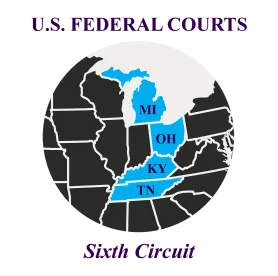The US Court of Appeals for the Sixth Circuit affirmed a jury verdict in favor of a copyright owner in a lawsuit alleging infringement of the copyright in a home-services training manual, finding that the jury was correctly instructed that a work’s incorporation of some copyrighted content does not invalidate the copyright in the work’s original parts. Hiller LLC v. Success Grp. Int’l Learning Alliance LLC, Case No. 19-6115 (6th Cir. Sept. 23, 2020) (Suhrheinrich, J.).
Hiller is a home-services company providing HVAC services. Hiller was a paying member of Success Group International, which offered customer service training to home services companies. Success Group conducted training courses using manuals copyrighted by its owner, Clockwork Home Services. Hiller sent its employees to Success Group’s courses and had access to the manuals. Clockwork later sold Success Group to another company, but retained ownership of the copyrights in the manuals and granted a perpetual license for use of the manuals in Success Group’s training business.
Hiller later hired a contractor to create a more interactive training guide for its technicians as a replacement for the manuals. To create the guide, the contractor conducted a two-day workshop with Hiller employees and representatives from Success Group. The workshop included a series of interactive brainstorming sessions. One of the manuals was referred to during the workshop. Ultimately the new guide incorporated some content generated at the design workshop. Other “gap-filling” content was taken directly from the manuals. The contractor also added other original content. The contractor assigned its copyright in the guide to Hiller.
The Success Group subsequently conducted a training class using a workbook that closely resembled the guide. Hiller ended its Success Group membership and sued Success Group for copyright infringement for its use of the workbook. Clockwork intervened, alleging that it owned the guide and seeking declaratory relief invalidating Hiller’s copyright in the guide. Following a seven-day trial, a jury concluded that Hiller had a valid copyright in the guide and that the Success Group workbook copied protected elements of the guide. Clockwork moved for a judgment notwithstanding the verdict, which the district court denied. Success Group ultimately settled with Hiller. Clockwork appealed.
The Sixth Circuit affirmed. First, the Court found that sufficient evidence supported the jury’s verdict that Hiller owned a copyright in the guide. The Court rejected Clockwork’s two-pronged argument that the guide lacked independently created material (required to meet the Copyright Act’s originality requirement) and that Hiller should lose its copyright because the guide contained content taken from the manuals. Based on its selection and organization, the guide contained enough originality created independently by or on behalf of Hiller (through Hiller’s contractor) to meet the originality threshold for copyright protection. The original material included information and graphical depictions selected and organized at the design workshop. The Court also rejected Clockwork’s argument that Hiller should lose copyright protection because the guide was based on Clockwork’s “copyrighted system.” Copyright protection does not preclude others from copying or using the underlying ideas contained in an author’s work, such as procedures, processes, systems, methods, concepts, principles or discoveries. Many of the similarities between the guide and the manuals (including advising technicians on where to park, how to interact with clients, what to wear and what tools to use) involved underlying ideas merged with their expression and were therefore not protectable under copyright law. The Court did not determine whether the guide was an unauthorized derivative work, but noted that even if the jury determined that it was, Hiller would retain its copyright in any discrete parts of the guide that were not copied from the manuals. Accordingly, the Court found that the jury reasonably concluded that Hiller had copyright protection over any original parts of the guide that did not incorporate copyright-protected content from the manuals.
Next, the Sixth Circuit determined that the jury was properly instructed that Hiller could hold a copyright in the guide, even though it contained Clockwork-copyrighted material, so long as that material did not “pervade” the entire work. The Court rejected Clockwork’s argument that the author of an unauthorized derivative work forfeits all copyright protection in the work. The jury instruction was a logical corollary of the Copyright Act’s provision that a work can be copyrighted even if it unlawfully incorporates pre-existing material, but that such protection does not extend to unlawfully used parts. The Court noted that the instruction was only necessary because the guide contained discrete parts, some of which were not based on protected elements of the manuals, whereas in most cases, a work that recasts another work without permission would contain no discrete parts that did not unlawfully use the original work. The jury was therefore correctly instructed that the guide’s incorporation of some Clockwork-copyrighted content did not invalidate Hiller’s copyright in the guide’s original parts.



 />i
/>i

